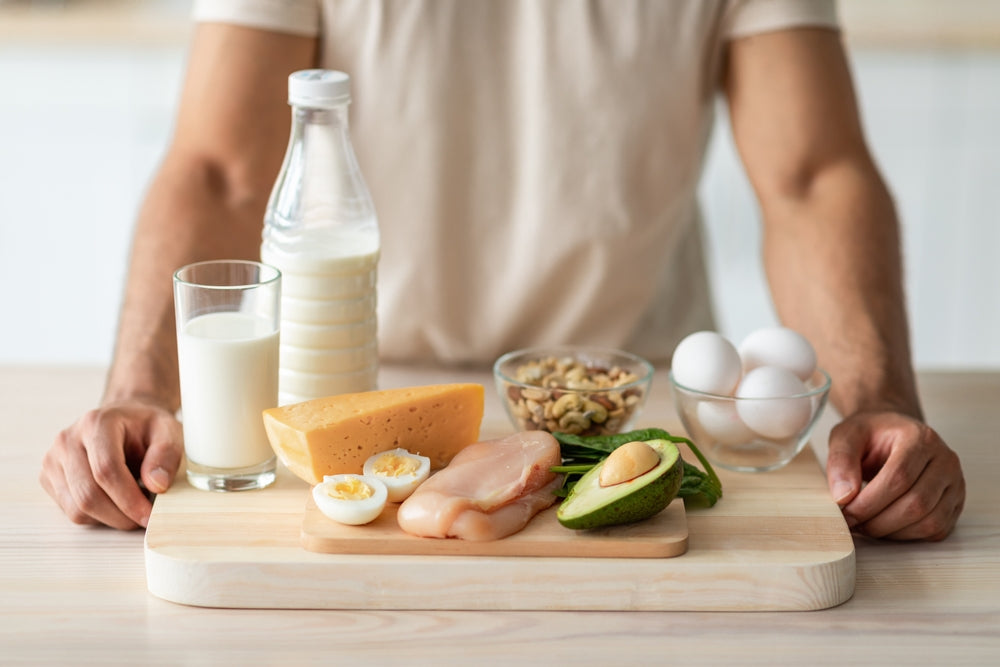After an intense workout, you might be so exhausted you just want to flop down on the sofa, floor, or yoga mat and call it a day. But no matter how tempting it seems to chill out, how you spend your time recovering after a workout is the key to maximizing your exercise gains.
Recovery is the body’s way of returning to homeostasis after stress. During a workout, your body creates microtears in your muscles to build them back stronger. This process, called hypertrophy, can only be completed if you refuel your body with enough good nutrition and encourage healthy blood flow to allow the body to undergo the healing and repairing process. Establishing post-workout recovery routines is essential for avoiding injury and allowing your body to rebuild your muscles stronger.
Post Workout Meal
Food is one of the best ways to refuel after a workout, and what you eat immediately after exercising matters.
In general, you want to eat around 30 minutes after a workout. Ideally, you would wait no longer than 45 minutes or an hour after working out before you eat something, whether it be a full meal or a restorative snack. This prime eating period after exercising is called the “post-workout anabolic window.” Waiting even as long as two hours to eat after a workout reduces your body’s ability to re-synthesize glycogen, which it needs for muscle repair, by about 50 percent.
What to Eat After Workout?
What should I eat after a workout? Contrary to popular belief, you actually can exercise after eating, and you don’t need to go into your workout on an empty stomach. But when it comes to what to eat after a workout, you may want to be a little picky. Some ideas for healthy post-workout snacks are:
- Apple and nut butter
- Chocolate milk
- Sweet potatoes
- Sardines on toast
- Hummus and pita
- Greek yogurt and berries
These snacks are high in amino acids, which your body uses to build back muscles in the hypertrophy repair process. And to avoid cramps, seek out foods rich in magnesium, such as:
- Avocados
- Leafy greens, like kale or spinach
- Almonds or cashews
- Fish, like wild salmon or halibut
If you’re still struggling to get enough magnesium when eating after workouts, you can also try taking an Epsom salt bath, which can help your sore muscles absorb the minerals they need.
How Much Protein After a Workout?
Protein after workouts remains the gold standard for what to prioritize in your meals. In general, eating about 20 grams of protein after a sweaty, intense workout should be sufficient, although you may need more or less depending on your body type and goals.
Even getting just 9 grams of milk-based proteins after a workout can help stimulate protein synthesis, ensuring your muscles can recover after strenuous exercise. Besides milk, some ways you can get enough dairy protein into your diet include:
- Greek yogurt
- Cottage cheese
- Ricotta cheese
- Kefir
Best Post-Workout Tips
Post-workout meals aren’t the only way to help your body recover. There are many other things your body needs to restore. These post-workout tips will help you avoid injury, maximize your gains, and stay fit and healthy.
Stretching

Stretching after working out, when your muscles are already warm, has several benefits. In addition to increasing your flexibility, stretching also helps circulate blood to tired muscles and breaks up the lactic acid buildup formed by working out. Because of this, stretching can help you feel less soreness after an intense workout. It also helps align your muscular coordination, enabling you to do better in future workouts.
Hydrate

While it’s possible to over hydrate, you’re not drinking enough water in all likelihood. Aim to drink one to two cups of water before you even begin exercising, and then try to take water breaks throughout. The human body needs anywhere from 2.7 to 3.7 liters of fluid daily, and if you’re losing a lot of water by sweating while you exercise, you’ll need to make sure to replenish your fluids just to reach this minimum level.
Supplements

Certain supplements can help your body function at its peak performance. Ashwagandha extract has been shown to effectively reduce stress, help the body recover, enhance focus, and maintain energy levels.
Ashwagandha has been used for centuries in Ayurvedic practice and is known as a “rasayana,” or nerve tonic. Its adaptogenic properties have been extensively studied. Revive’s patented KSM-66 formula delivers the most complete ashwagandha of all “root-only” extracts available.
Massage

Massage is another way to relieve the buildup of lactic acid in muscle groups after exercise. Using a foam roller or your hands, gently massaging areas that you’ve spent extra time on during a workout can help dissipate fatigue and soreness, stimulating muscle recovery.
Be sure to move slowly, and use intentional relaxed breathing during the process, to work through any tender spots. Besides helping you relax and feel better, some studies show that massaging your muscles after working out will increase muscle strength and power over time.
Takeaway
Whether looking for the best post-workout meal, a healthy post-workout snack, or dietary supplements to add to your routine, establishing a good recovery routine is one of the most important things you can do to get the most out of every workout. Staying fit and active is more than just doing lots of reps, squats, or cardio. Your recovery routine is what allows your body to reap the rewards from exercise to keep you healthy and strong.
The information being presented in this blog is intended to be used as educational or resource information only. It is not intended to be a substitute for medical advice from your healthcare provider. This content should not be used for the diagnosis or treatment of any medical condition. If you have any questions or concerns about your health, please contact your healthcare provider. You should call 911 for all medical emergencies. Revive MD is not liable for any advice or information provided on this blog, which advice or information is provided on an “as-is” basis, and assumes no liability for diagnosis, treatment, decisions, or actions made in reliance upon any advice or information contained on this blog. No warranties, express or implied, are made on the information that is provided.





 Liver & Detox Support
Liver & Detox Support
 Gut & Digestive Health
Gut & Digestive Health
 Hormones, Stress & Metabolism
Hormones, Stress & Metabolism
 Sleep & Relaxation
Sleep & Relaxation
 Heart, Brain & Immune Health
Heart, Brain & Immune Health


